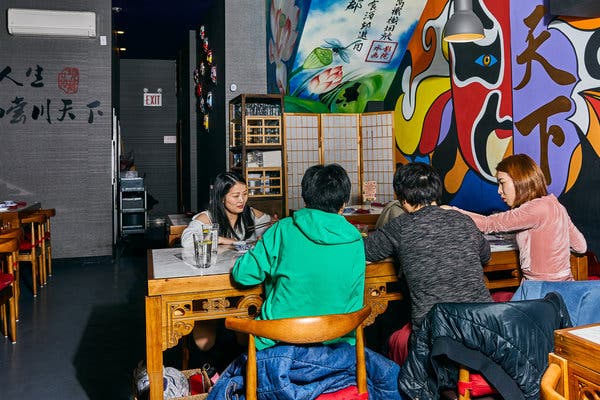Yu xiang qie zi is fish-fragrant eggplant, which has no fish. It is simply, grandly, eggplant treated like fish, cooked with paojiao — chiles pickled but still bright — and doubanjiang, a paste of broad beans left to ferment for months, then dosed with chiles and fermented some more. Ginger brings sweetness, vinegar the sourness of time.
At Chuan Tian Xia, a Sichuan restaurant that opened a year and a half ago in Sunset Park, Brooklyn, this is a dish of excess, a great massing of eggplants, long trunks with skins caramelized at the edges, flesh surrendered to sauce. On a recent evening, there seemed to be more eggplant than my table of eight could ever eat, and then it was gone.
The restaurant’s owners, Queenie Dong, 29, and her husband, Zee Zheng, 34, have long called New York home. Their fathers came to the city first, in the 1990s, from Fujian Province on China’s southeastern coast; they wanted to be sure they could build a life here before asking their families to join them. Mr. Zheng arrived when he was 7, Ms. Dong when she was 19.
As newlyweds, they helped Mr. Zheng’s parents run a Japanese restaurant in the Throgs Neck section of the Bronx. But the younger couple wanted a place of their own, showcasing the spicy food they loved, Ms. Dong said. So they went to Chengdu, the capital of Sichuan in China’s southwest, to find their chef, Zhenghua Zhang, and tempt him to New York.

The restaurant, spilling over two levels, is often besieged (rightly) and can be raucous, with groups huddled on cushioned banquettes and low wooden stools. Traditional Beijing opera masks line the walls and loom in a psychedelic mural of giant faces.
The classic Sichuan dish gan bian si ji dou — green beans dry-fried in a wok on low heat until blistered and wrinkly but still juicy within — is revamped with cauliflower, stalks faintly green. Finished at the table on a portable burner, it’s free of the usual ground pork, so it’s a true vegetarian dish. The scent alone makes you thirst, a flavor before the flavor.
Salted egg yolks, dark and oily, are steamed, mashed and beaten into a creamy custard the color of sea urchin roe, with buried treasure of soft tofu and imitation crab. It’s rich and forthright in funk.
Fish might come wrapped in foil and parchment, to be undressed at your table, revealing a loose sheath of chiles and scallions, then gently slashed with a spoon. Or delicate, flaking slices might appear in a broth of fish and pork bones, simmered for half a day and mobbed with fresh tengjiao (a type of green Sichuan peppercorn). “You can drink it,” Ms. Dong said, and I did, eating the fish as an afterthought.
What Mr. Zhang calls fortune pepper fish is his take on a Hunan dish, duo jiao yu, which is often made with just the fish head. Here, it comes whole, steamed with a dense, vivid overlay of pickled chiles and fermented black beans, laid on so thick, only the tail is visible.
Ragged ribbons of fatty beef, lush and vanishing on the tongue, run through suan tang fei niu, a profoundly sour soup. Each spoonful is a ratchet up in sourness: pickled chiles declaring themselves in the depths, along with pickled garlic, pickled cabbage and a generous slosh of rice vinegar.
The soup is laced with huajiao, Sichuan peppercorns, both green, for fragrance, and red, for flavor. These aren’t hot — that’s the job of the chiles — but floral, and both bring a prickling to the lips, like the snap of an electric current. Still, neither is present in enough force to leave you numb.
(Nothing I’ve eaten here, or anywhere in New York, has been as humbling as the Sichuan food I had a few months ago in Shanghai. There, it felt as if I were being kissed by a horde of invisible bees. And that, a friend from Chengdu insisted, was a pale shadow of what you find in Sichuan.)
At Chuan Tian Xia, mala — Sichuan’s distinct marriage of tingling huajiao and incendiary chiles, numbing force and feral heat — is only one shade of the meal. With every bite, you start to speak a complicated language of salt and smoke; lancing sourness; sweet never without its partner, bitter. You breathe garlic.
“There’s complimentary mouthwash,” one of my companions announced on a return from the restroom. We laughed, because what good would it do? And kept eating.
Follow NYT Food on Twitter and NYT Cooking on Instagram, Facebook, YouTube and Pinterest. Get regular updates from NYT Cooking, with recipe suggestions, cooking tips and shopping advice.



